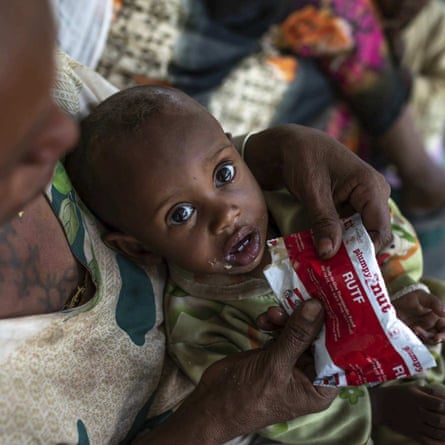Only a third of children under two in many developing countries are fed what they need for healthy growth and no progress has been made on improving their nutrition over the past decade.
Unicef, the UN’s children’s agency, said in a report published on Wednesday that a combination of crises from Covid-19 to conflict and the climate breakdown had stunted progress on children’s nutrition in 91 countries.
According to the report, half of children aged from six to 23 months across a range of developing countries were not fed the minimum number of daily meals and even fewer had a diverse diet that met minimum requirements.
Ahead of the UN’s food security summit on Thursday, Unicef UK said the British government could help tackle the problem by investing in nutrition.
As a result of poor diets, children can fall behind in school, become more vulnerable to illness and suffer the effects of malnutrition, including stunting and wasting, as well as becoming overweight or obese. Unicef estimates more than 11 million children under two are vulnerable to wasting globally.

Jenny Vaughan, Unicef UK’s senior policy adviser on child health, said: “Millions of children around the world are affected by the life-limiting outcomes of poor nutrition.
“By investing £600m to reach 50 million children over the next five years with nutrition-relevant programmes, the UK government would be making a significant contribution to addressing this problem and put millions of children on a path to healthier and brighter futures.”
In May, the charity Save the Children estimated that the UK’s aid cuts would mean spending on hunger could be slashed by almost £100m compared with 2019.
Nutrition was worst for children in rural or poorer families, according to the study, and varied by region. In Latin America and the Caribbean, the diets of 62% of children aged between six and 23 months met the minimum diversity requirements compared with less than a quarter in Africa and only 19% in south Asia.
The report said that many families now bought their food rather than producing it themselves, even in rural areas, which made them more dependent on food systems.
“Despite this very worrying analysis, progress can still be made with joint global action to build, strengthen and transform food systems so children can get the nutrition they need to survive and thrive,” Vaughan said.
It said governments needed to ensure there were strong food systems that reliably supplied nutritious diets, including fruit, vegetables, meat, eggs, fish and fortified foods.
The UN’s Food and Agriculture Organization (FAO) said last week that the food summit was taking place at a key time, after five years of the number of those affected by hunger growing globally to about 811 million people, after a period in which it declined.
“Many of the current agri-food practices are also exacting a heavy toll on our planet. Our agri-food systems are not functioning properly,” said the FAO’s director general, Qu Dongyu.
He said the key was transforming the system that delivers food, from “tillage to table”, and would rest on actions taken at the local and international level.
